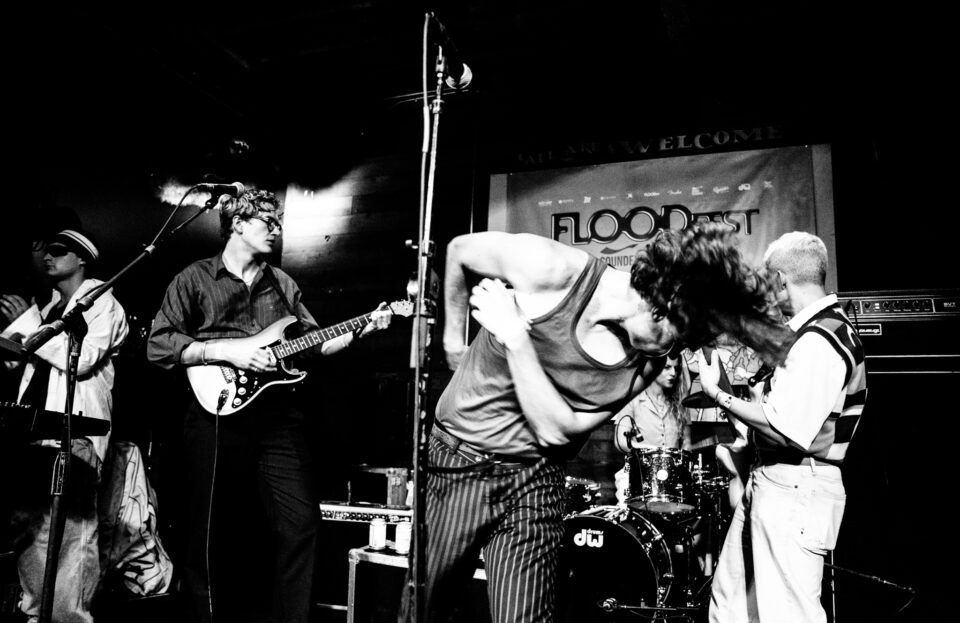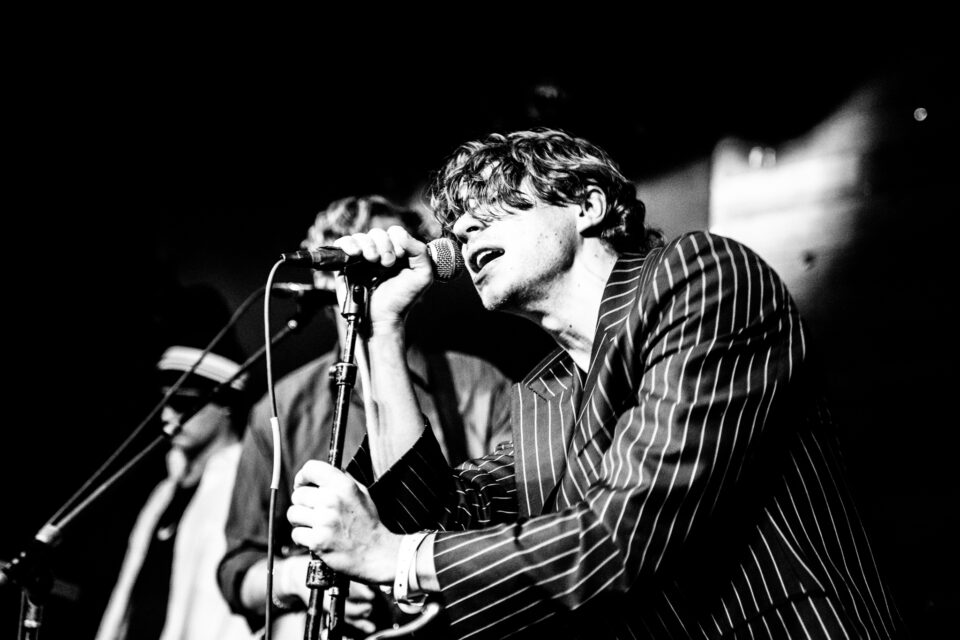Sports Team would be primed to clean up if cheeky wit were a category at music award ceremonies—maybe they could even give Oasis a run for their money. That’s where those bands’ similarities end, though. The London-based six-piece got together as teens, solidifying their band status while attending Cambridge, where they played at raucous parties and university halls with no expectations about their futures beyond landing a regular day job (lead guitarist Henry Young even became a sports writer at CNN after graduating). Once the opportunity to tour crept up, though, it was just too alluring for each band member not to take being in a band seriously and leave their old lives behind.
When speaking with Sports Team, you can’t help but notice the group chemistry—they could’ve been in the same room, even though in reality they were all talking to me from different locations when we connected over Zoom. There’s a good reason why they built the reputation they have for being one of the best live bands out of London—lead vocalist Alex Rice’s charisma and the combined wit of drummer Al Greenwood, rhythm guitarist Rob Knaggs, lead guitarist Young, and bassist Oli Dewdney blend exceptionally well (keyboardist Ben Mack wasn’t present for the call, but one can imagine he’d have to have a certain amount of charisma and wit to run with this squad). Sports Team is authentic, fun, and sometimes even serious, and their live act balances a unique slacker-rock style with the more cocksure rock ’n’ roll swagger of AC/DC.
Recorded in Norway, their third and latest album Boys These Days moves away from the guitar-heavy stylings recalling Pavement or Parquet Courts heard on previous releases, and instead integrates a shiny UK new wave sound inviting comparisons to Prefab Sprout and Aztec Camera (Knaggs highlights the former’s ability to have really serious lyrics and some that are “stupid and dumb and off-the-cuff” as an influence). It’s a change that occurred during the free time brought about by COVID-19, which allowed them to explore other avenues. “I think during the press for the second album we were talking a lot about Prefab Sprout and Bryan Ferry and stuff, and maybe this is the first time that it’s obvious to the listener,” says Dewdney about the new record, which is slated to arrive in February.
“We were probably getting more comfortable in the studio,” adds Knaggs. “You know, there was definitely a part during the first record where I’d do just octave chords. So it’s like, you can do some kind of Strokes-y riffs and that.”
On Boys These Days, the group uses nostalgia in a tongue-in-cheek way. The album’s lead single “I’m in Love (Subaru),” which is about fetishizing a motor vehicle, is instrumentally soaked in the idiosyncratic sounds of the ’80s—saxophones and synth lines—as it falls somewhere between Prefab Sprout’s “When Loves Breaks Down” and an early Springsteen record, like Greetings from Asbury Park, N.J. or The River. This leap in craftsmanship is mostly in arrangements because, lyrically, the focus is still on middle-class malaise, a theme they share with the ’90s output of bands like Blur and Radiohead. Still, the latest album balances early Sports Team’s style with this new era well. “It’s obviously not the fucking Beatles moment where we all go to India and start meditating,” says Knaggs, clearly aware of the group’s shift in sound.

Sports Team / photo by Skylar Watkins
“I think during the press for the second album we were talking a lot about Prefab Sprout and Bryan Ferry and stuff, and maybe this is the first time that it’s obvious to the listener.” — Oli Dewdney


Sports Team / photo by Skylar Watkins
Some have pinned Sports Team as Tories due to the fact that they attended Cambridge. It’s an accusation that doesn’t bother the band, though—to them, songwriting is only authentic when it comes from an actual perspective and it’s not just cosplay. In that sense, their music is far from conservative (either way, they get a pass because their Manchester-born drummer Greenwood is unrelated to her namesake, Radiohead’s Jonny Greenwood—hence, not British music royalty). “It’s funny, isn’t it? It’s quite performative a lot of the time,” says Rice. “I think it’s sort of genre-led, the idea that you’d think of IDLES as more of a working-class band is really odd.
“There’s a lot of signifiers, and I think in the UK it’s kind of very bound up in genre,” Rice continues. “’Cause there’s obviously this amazing heritage of working-class music, bands like Oasis and stuff like that coming out of Manchester. There’s a unique set of experiences if you grew up in suburban England that you can tap into and write about. I won’t name any names, but I think there are a few people who stick a black cap on and ham up the accent.”
“We’ve got a super young, really politically engaged and smart group of fans following us,” notes Greenwood. “And there’s absolutely no chance in hell that they could mistake or misunderstand what we’re standing for.”
“It’s obviously not the fucking Beatles moment where we all go to India and start meditating.” — Rob Knaggs

Despite accusations of privilege, their music speaks for itself and is more self-aware than given credit for. They often sing of middle-class life, always done with a perceivable sardonic undertone. This detachment sometimes gets the better of them on social media, though, inadvertently landing them in feuds—something they claim is culturally ingrained from exposure to the UK press. “I used to read NME every week, and it always used to just be so tabloidy—it’s entertainment, you know,” says Knaggs. “It’s Oasis versus Blur. Or like when we were kids it was probably Keane getting bullied by Razorlight, and Johnny Borrell saying all this insane stuff about the guy having, like, a porn addiction.”
Music journalism can be a crapshoot of bad opinions and lack of depth. According to Knaggs, a shining example of this being the dreaded seven-out-of-10 rating, a liminal space for meek music opinions. “It’s always great when we go on Twitter and see some [critic] who’s really nailed us,” says Knaggs. “Somebody who’s really like, ‘Got you good!’ That’s more satisfying to read than a solid seven.”
”Give it a 10, but make it read like a zero,” says Rice. At that, I promise not to give their new album a seven rating as we say our goodbyes. FL







